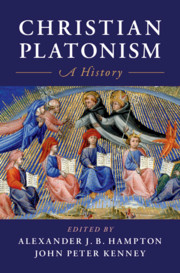Book contents
- Christian Platonism
- Christian Platonism
- Copyright page
- Dedication
- Contents
- Figures
- Contributors
- Acknowledgements
- I Concepts
- 1.1 The Perennial Value of Platonism
- 1.2 The Ideas as Thoughts of God
- 1.3 The One and the Trinity
- 1.4 Creation, Begetting, Desire, and Re-Creation
- 1.5 The Concept of Theology
- 1.6 Participation: Aquinas and His Neoplatonic Sources
- II History
- III Engagements
- Index
- References
1.2 - The Ideas as Thoughts of God
from I - Concepts
Published online by Cambridge University Press: 20 January 2021
- Christian Platonism
- Christian Platonism
- Copyright page
- Dedication
- Contents
- Figures
- Contributors
- Acknowledgements
- I Concepts
- 1.1 The Perennial Value of Platonism
- 1.2 The Ideas as Thoughts of God
- 1.3 The One and the Trinity
- 1.4 Creation, Begetting, Desire, and Re-Creation
- 1.5 The Concept of Theology
- 1.6 Participation: Aquinas and His Neoplatonic Sources
- II History
- III Engagements
- Index
- References
Summary
The notion of Platonic Forms as divine thoughts was critical to the theistic interpretation of Plato’s philosophy. This chapter considers the origins and development of the theory of divine ideas. The chapter begins by examining the evidence for this theory in the Old Academy, including Speusippus, Xenocrates and Aristotle. The notion is then traced among subsequent Platonists, including Antiochus of Ascalon, Eudorus of Alexandria, Alcinous, and the Jewish philosopher Philo of Alexandria. The reception of the theory of divine ideas in Christianity concludes the chapter, with reference to Origen of Alexandria and Maximus the Confessor.
- Type
- Chapter
- Information
- Christian PlatonismA History, pp. 34 - 52Publisher: Cambridge University PressPrint publication year: 2020
References
- 2
- Cited by

